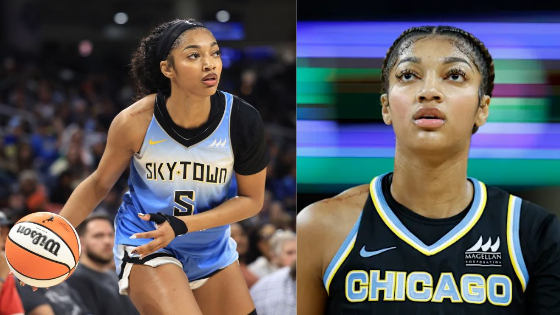Angel Reese’s rookie season with the Chicago Sky has been defined as much by controversy as dominance. The league’s leading rebounder was suspended twice in early September, once by the WNBA for technical fouls and once by her own team for critical comments.
The first suspension came through league rules rather than organizational discretion. On Sept 4., Reese was assessed her eighth technical foul of the season during a game against the Connecticut Sun. The incident, which occurred late in the second quarter, involved contact with Sun forward Aaliyah Edwards as Reese spun under the basket. Officials deemed the move a “flail” and issued the technical. Under WNBA policy, a player who accumulates eight technical fouls in a season is automatically suspended for one game without pay. For Reese, that meant sitting out the Sky’s upcoming contest against the Indiana Fever. The decision was straightforward and consistent with league regulations but added to a growing perception that Reese’s style of play was drawing extra scrutiny from officials.
Only days later, a far more complicated suspension was announced from within the Sky organization itself. In an interview with the Chicago Tribune, Reese voiced frustrations with the team’s performance and future direction. She remarked that she was “not settling for the same s**t we did this year” and called for the front office to bring in “great players” to ensure improvement in 2026. She also raised questions about the long-term reliability of veteran point guard Courtney Vandersloot, who had missed much of the season with a torn ACL and hinted that she might consider her own future with the franchise if the roster did not evolve. While such candid assessments might resonate with some fans, the Sky deemed them “statements detrimental to the team” and handed Reese a half-game suspension. She was benched for the first half of Chicago’s matchup against the Las Vegas Aces, a punishment meant to send a clear message about professionalism.
The disciplinary action became even more complicated when Reese’s chronic back injury flared up around the same time. After serving the half-game suspension, she did not return for the second half against the Aces due to pain management, and she was subsequently ruled out for the Sky’s season finale against the New York Liberty. That left her on the sidelines at a moment when her team was already out of playoff contention, magnifying the frustration of a disappointing campaign. For a player who had been one of the few bright spots in a difficult season, the timing of the injury and suspension raised questions about how both her health and role within organizations would be managed moving forward.
Reese responded publicly with an apology after the controversy, emphasizing that her words had been used out of context and that she did not intend to disrespect her teammates. She clarified that her criticisms were meant to reflect a competitive drive and a desire to win at the highest level. Head Coach Tyler Marsh declared this as an internal issue, explaining that the organization wanted to reinforce standards of respect while also moving forward constructively. The situation nonetheless revealed the delicate balance between allowing a young star to voice her ambition and protecting the cohesion of a professional locker room.
Statistically, Reese’s contributions have been undeniable. She averaged nearly 15 points per game and 12.6 rebounds, finishing with 23 double-doubles and establishing herself as one of the league’s premier interior presences. Her relentless work on the boards gave Chicago an identity in an otherwise uneven season, and her production positioned her as a foundational piece for the franchise. Yet her public comments, technical foul accumulation and ensuing suspensions showed how quickly narratives in professional sports can shift from dominance to disruption. A season that should have ended with unanimous praise for her on-court growth instead concluded with debates about maturity, leadership and organizational culture.
The larger implications of Reese’s suspensions extend beyond the technicalities of WNBA policy; they show the tension between authenticity and diplomacy in professional athletics, particularly for young players whose every word is amplified by media coverage. Reese’s frustrations about roster construction were not unusual; stars across sports often push management to pursue upgrades. Her willingness to voice those concerns directly, coupled with her role as a rookie, made the comments stand out. For the Sky, already struggling to establish stability, the decision to discipline her publicly may have been as much about setting precedent as about punishing one player. At the same time, silencing candid criticism ultimately harms a team’s ability to confront the issues that caused the frustration in the first place.
What remains clear is that Angel Reese is no ordinary rookie. Her first professional season has already encompassed dominance, controversy, injury and organizational conflict, all while under the bright lights of one of the league’s most scrutinized markets. How she and the Sky navigate the lessons of this suspension may well shape not only her career trajectory but also the conversation about player empowerment and accountability in the WNBA.

